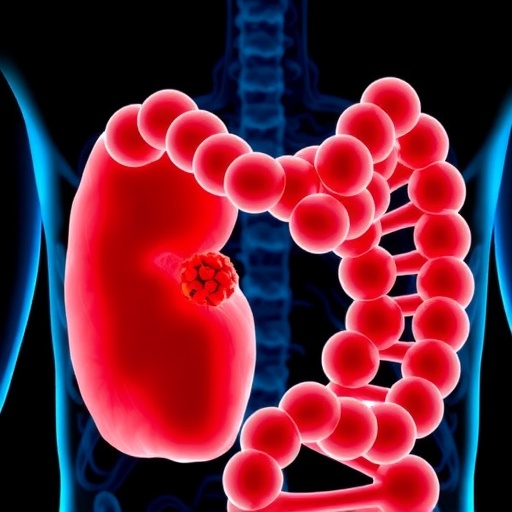In the pursuit of precision oncology, circulating tumor DNA (ctDNA) heralds a new frontier in the management of Stage 3 colon cancer, as demonstrated by the groundbreaking findings of the DYNAMIC-III trial. This international, multi-institutional study, spearheaded by experts at the Johns Hopkins Kimmel Cancer Center in collaboration with research centers across Australia and Canada, explored the prognostic and therapeutic potential of ctDNA to refine postoperative chemotherapy strategies. By analyzing ctDNA—a biomarker comprising fragmented genetic material released by tumors into the bloodstream—clinicians can now stratify patients’ risk profiles with unprecedented specificity, enabling personalized treatment regimens that could mitigate unnecessary toxicity while preserving efficacy.
Stage 3 colon cancer is characterized by tumor invasion beyond the mucosal lining into regional lymph nodes. Historically, management has relied on adjuvant chemotherapy with fluoropyrimidine-based regimens combined with oxaliplatin, a protocol that, while effective, frequently exposes patients to severe toxicities, including persistent neuropathy related to oxaliplatin. The DYNAMIC-III trial innovatively leveraged postoperative ctDNA status to tailor therapeutic intensity—escalating chemotherapy for ctDNA-positive patients who harbor residual microscopic disease and de-escalating treatment for ctDNA-negative patients who presumably have minimal relapse risk.
The trial enrolled 1,002 patients within five to six weeks of surgery, dividing them between ctDNA-guided therapy and conventional treatment arms. Those testing positive for ctDNA received intensified treatment, with approximately half administered a triplet chemotherapy regimen called FOLFOXIRI, incorporating folinic acid, 5-fluorouracil, oxaliplatin, and irinotecan, designed to aggressively combat residual disease. Conversely, ctDNA-negative patients underwent reduced chemotherapy courses, primarily entailing lower doses or shorter durations of oxaliplatin-based doublets. This stratification was aimed at conserving patient quality of life by circumventing overtreatment without compromising oncological outcomes.
After a median follow-up of nearly four years, the ctDNA-negative cohort exhibited a remarkable 49% recurrence rate reduction compared to ctDNA-positive counterparts, underscoring ctDNA’s robust prognostic capacity. Importantly, ctDNA-guided de-escalation correlated with substantial declines in chemotherapy-associated morbidities, including a 54% reduction in oxaliplatin use, fewer hospital admissions, and diminished high-grade adverse events. Notably, three-year recurrence-free survival remained comparably high in the de-escalated group, suggesting that minimizing chemotherapy exposure did not significantly compromise disease control in low-risk patients.
However, escalation for ctDNA-positive patients did not yield proportional survival benefits when juxtaposed with standard care. Recurrence-free survival at two years was 51% in patients receiving intensified treatment versus 61% in those undergoing conventional therapy, suggesting innate chemoresistance or biological aggressiveness in these tumors. This gap signals an urgent need for innovative therapeutic avenues or adjunct modalities tailored to ctDNA-positive disease biology to enhance patient outcomes.
One of the most compelling revelations of the DYNAMIC-III study is the stark prognostic divide between patients with persistent ctDNA post-chemotherapy and those whose ctDNA clears. Persistent ctDNA correlated with a dismal three-year recurrence-free survival rate of 14%, contrasting sharply with 79% for patients demonstrating ctDNA clearance, indicating that ctDNA dynamics may become critical biomarkers for real-time treatment monitoring and risk-adapted clinical decision-making.
An intriguing aspect of the data involved recurrence patterns among ctDNA-negative patients, wherein relapse predominantly occurred at anatomical sites such as the lungs and peritoneum—regions that seemingly release less ctDNA into circulation—highlighting inherent limitations in ctDNA detection sensitivity. These findings accentuate that while ctDNA is transformative, it may require integration with complementary imaging or molecular modalities to comprehensively gauge minimal residual disease burdens.
The paradigm-shifting implications of the DYNAMIC-III trial echo the pioneering conceptual groundwork laid by Bert Vogelstein and colleagues. Their seminal discoveries elucidated the genetic mutational sequences driving colon carcinogenesis, laid the foundation for liquid biopsy technologies, and opened avenues for non-invasive tumor surveillance through ctDNA profiling. These advances now converge to inform clinical practice, promising to alleviate patient burden by obviating unnecessary chemotherapy and focusing intensified treatment where most needed.
Contextually, this study builds upon earlier evidence endorsing ctDNA’s utility in Stage 2 colon cancer, thereby bolstering the momentum toward widespread adoption of ctDNA-guided personalized medicine frameworks. By integrating molecular biomarkers into therapeutic algorithms, clinicians inch closer to an era where interventions are precisely calibrated to tumor biology and individual patient risk, a transformative shift from the one-size-fits-all approaches of yesteryear.
Moving forward, the integration of ctDNA assays across diverse tumor types, alongside ongoing refinements in assay sensitivity and specificity, could rapidly expand the scope of personalized oncology. However, challenges remain, particularly in defining optimal treatment intensification strategies for ctDNA-positive patients and enhancing ctDNA detection in sanctuary sites. Collaborative efforts involving molecular scientists, oncologists, and clinical trialists will be pivotal in translating these promising findings into routine clinical protocols and improved patient survival.
In sum, the DYNAMIC-III trial elucidates a pioneering use of ctDNA as a actionable biomarker, enabling tailored adjuvant chemotherapy in Stage 3 colon cancer that optimizes therapeutic efficacy while reducing unnecessary toxicity. This advancement represents a milestone in precision cancer care, combining cutting-edge molecular diagnostics with patient-centric treatment paradigms to redefine standards of care and improve clinical outcomes.
Subject of Research: Circulating tumor DNA (ctDNA) as a biomarker to guide adjuvant chemotherapy in Stage 3 colon cancer.
Article Title: ctDNA-guided approach to adjuvant chemotherapy in stage 3 colon cancer.
News Publication Date: October 20 (year unspecified).
Web References:
Johns Hopkins Kimmel Cancer Center: https://www.hopkinsmedicine.org/kimmel_cancer_center/
European Society for Medical Oncology Congress 2025: https://www.esmo.org/meeting-calendar/esmo-congress-2025
References: Published in Nature Medicine on October 20.
Image Credits: Modified from Jeanne Tie, M.D.
Keywords: Cancer, Colon cancer, Circulating tumor DNA (ctDNA), Adjuvant chemotherapy, Precision medicine, Stage 3 colon cancer, Oncology, Chemotherapy de-escalation, Chemotherapy escalation, FOLFOXIRI, Minimal residual disease, Liquid biopsy
Tags: adjuvant chemotherapy protocols for colon cancercirculating tumor DNA in colon cancerctDNA as a biomarker for cancerDYNAMIC-III trial findingsinnovative cancer treatment approachespersonalized treatment regimens for cancerprecision oncology in postoperative treatmentprognostic implications of ctDNA statusreducing chemotherapy toxicity in cancer patientsrisk stratification in cancer treatmentStage 3 colon cancer managementtailoring chemotherapy based on ctDNA





